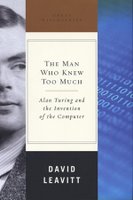Leavitt, David. The Man Who Knew Too Much. New York: Atlas/Norton, 2006.
 Alan Turing was a mathematician who solved previously unsolved problems and helped invent both the computer and the field of artificial intelligence. He also worked at Bletchley Park during the Second World War, and built a machine that could intercept and decode ciphers created by the German Enigma machine, which everyone thought was unbreakable. These decodings undoubtedly saved lives and helped the Allies win the war.
Alan Turing was a mathematician who solved previously unsolved problems and helped invent both the computer and the field of artificial intelligence. He also worked at Bletchley Park during the Second World War, and built a machine that could intercept and decode ciphers created by the German Enigma machine, which everyone thought was unbreakable. These decodings undoubtedly saved lives and helped the Allies win the war.In 1952, Turing was arrested for gross indecency with another man. This was more than 50 years after Oscar Wilde was arrested for the same charge. His sentence was to receive state-sanctioned injections of estrogen. He gained weight and grew breasts. Two years later he committed suicide by poisoning himself with a cyanide-laced apple.
Leavitt makes much of Turing's homosexuality in the book, and for a while it was to the point where even I wondered whether such a connection between, say, intelligent machines and societally-ignored gays was really helpful to his project. Then the book ended the way it did, with Turing's final (and really only, like, third) love affair turning him into an emasculated criminal, and I understood that Leavitt's main theme comes out of the constant bewilderment, frustration, and anger he must feel as a gay man living in a straight world. Or maybe I'm projecting.
Previous books on Turing, according to Leavitt, have downplayed his sexuality as tangential to his accomplishments, or even irrelevant. Leavitt's shown that to fully understand Turing's accomplishments and why they're so significant one must understand his sexuality and the different ways gay men go about approaching the world. That the book isn't getting reviewed much in the major papers isn't surprising—as per the aims of the Great Discoveries Series of which it's a part, the book is very dense and technical, to the potential alienation of casual readers—but that it's receiving just as little attention in the gay press is upsetting. I think it's a story everyone should know.


0 Comments:
Post a Comment
<< Home